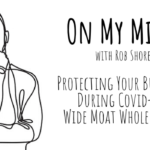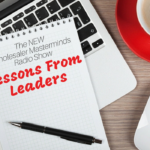Think about the last five trinket/gift items you gave advisors.
The faux high-end pen?
A Starbucks coffee card?
Or the always popular Omaha Steaks?
In the summer of 2024, while vacationing with his family, John collapsed and was unable to be revived. He passed at the young age of 44.
We thank John for his life’s work and for this podcast contribution he made to our wholesaling community.
John Ruhlin was the founder and CEO of the Ruhlin Group, a firm that specializes in high-level gifting plans to build relationships and acquire new clients.
The Ruhlin Group’s partnership with Cutco has enabled it to become the No. 1 distributor of Cutco in their 65-year history.
John is a sought-after speaker on the topics of C-level selling, relationship development, and strategic gifting; he is also the co-author of the best-selling book “Cutting Edge Sales” and the author of the recently released book “Giftology.”
5 Rules for Gifting in the Financial Industry
Standing out in the financial industry is a challenge. Wholesalers might offer a few different bells and whistles, but the products they sell to advisors are largely similar. The only way to stand out is by establishing a great relationship. And the surest way into someone’s good graces is through generosity and gift giving.
Of course, not just any gift will suffice. Anyone can send a middle-grade bottle of wine or a restaurant gift certificate. Unless you know the advisor loves that type of wine or has been dying to try that eatery, the gesture is nice but generic. The impact will fade quickly. But if you give gifts that speak to clients’ personalities or fills a long term need, you’ve got their attention for the long haul.
Simple Gifts, Big Returns
I once met a CEO I admired at a fantastic charity conference. After the event, I sent him a set of custom engraved Cutco knives and a note thanking him for carving out the time to talk with me. He then connected me with the leader of a high-level mastermind group, which led to several other introductions. Those relationships brought numerous business opportunities that boosted my company’s profile.
You know how I continue to cultivate those connections? Through gifts. I regularly send handmade cutlery, custom wine tools, and even high-end green cleaning supplies to my key contacts and their spouses. That keeps me top of mind for new opportunities and event invites.
If you want to achieve similar success with financial advisors, use my five rules of gifting to cultivate genuine, reciprocal relationships:
Gift Generously
Generosity in this case refers to thoughtfulness and class, not price. Gifts should not seem like a tit-for-tat exchange. If an advisor writes a lot of business with you and you immediately send over a bottle of wine, the relationship feels transactional. Sure, you’re both benefiting, but the gift appears obligatory rather than sincere.
Instead, send a nice thank-you note in the days following the business. Then, take time to consider what this person would actually like to receive. Invest in items that you know will make a mark. For instance, don’t give a cheap laptop bag from China with your logo on it. Most people who are top affluent advisors know their stuff, and they’re not going to be impressed by a sub-par trinket. Attention to quality in all areas is how you earn a reputation for being best in class in a sea of noise.
Gift Unexpectedly
Think about the last time someone did something nice for you totally out of the blue. It probably made your day, right? You can create the same experience for your customers. The next time you meet with a financial advisor for the first time, bring the best coffee your city has to offer or another small delicacy to brighten his or her morning. That detail alone could pave the way for a lucrative relationship.
Unexpected gifts show that you prioritize your clients’ happiness. This is true no matter your industry. A friend of mine runs several unsexy companies, and he uses gifts to bring a bit of glamour to his brand. He sends fresh flowers to his customers after a paint job is finished and instructs employees to bring Starbucks to clients’ homes before they start work moving in the mornings. Those simple touches generate more referrals than the companies’ primary offerings.
Gift the Inner Circles
No one holds more sway than people’s significant others, families, friends, and assistants. They’re not the gatekeepers for referrals, but their voices ring loudest when clients contemplate which deals and relationships to pursue.
Just as you use gifts to impress clients themselves, extend the courtesy to their core teams as well. This might include subscription boxes for the family or a nice bouquet for someone’s assistant. When I took on my first NBA client, I gifted the assistant as often as I did the executives. She eventually set up meetings with five other department heads and helped my company land a six-figure deal. I treated her like an equal, so she was willing to open new doors for me.
Gift Authentically
This rule might be the easiest to follow – all you have to do is treat people like human beings. You don’t need to give over-the-top, expensive gifts. Choose something people actually want, and give the best version you can afford. Even a simple portfolio can wow clients if it’s personalized and handmade.
Don’t sacrifice quality simply because the gift is a common item. Some people question why they would spend $100 on a portfolio when they can buy a decent one for $30. The cheaper one is functional, but you’re playing average with that option. What’s the point of investing time and money in a gift only to have it be forgotten or re-gifted the next day?
Gift Regularly
Gifting isn’t a one-and-done process. Keep adding value throughout the life of the relationship. That doesn’t mean sending custom cutlery or cleaning services every other month (though that doesn’t hurt). Send a handwritten note, make an introduction, and invite clients out for a nice dinner a few times a year. As long as you keep each touch world class, you don’t need to drop thousands of dollars just to reconnect.
Once you’ve established yourself as a regular presence, you’ll see the reciprocity scale tip in your favor. I have one client-turned-friend who often thanks me for being “the better friend” by going out of my way to keep in touch. My willingness to stay in touch without keeping score has led to some incredible connections. Over time, the client and friend has returned the favor, so to speak, by introducing me to other influencers, bringing my company new business, and even writing the foreword to my book.
Conversations with wholesalers are a dime a dozen for advisors until one of them stands out with a spectacular act of kindness. People can’t help but feel warmly toward businesses that treat them as people and not just a means to greater profits. Gifts show that you respect and value advisors as individuals, and that opens the door for that second meeting and all of the deals that come after.
Written by John Ruhlin


 Storytelling: The Wholesaler’s Secret Weapon with Rob Salafia
Storytelling: The Wholesaler’s Secret Weapon with Rob Salafia Become a Crazy Good Speaker! with Deirdre Van Nest
Become a Crazy Good Speaker! with Deirdre Van Nest Data and a Wholesaler’s Search for Deeper Advisor Relationships: Wholesaler Tech Talk with Tim Kresl
Data and a Wholesaler’s Search for Deeper Advisor Relationships: Wholesaler Tech Talk with Tim Kresl On My Mind: Protecting Your Business During Covid-19: Wide Moat Wholesaling
On My Mind: Protecting Your Business During Covid-19: Wide Moat Wholesaling Lessons From Leaders #7: Interview with Kevin McGarry, National Sales Manager, Nationwide Mutual Funds
Lessons From Leaders #7: Interview with Kevin McGarry, National Sales Manager, Nationwide Mutual Funds